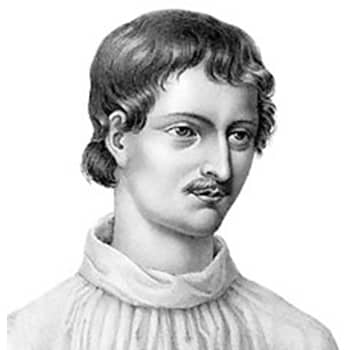Podcast: Download
Subscribe: Apple Podcasts | RSS

As an author, Greer is known for his work with the ideas of Giordano Bruno and, most recently, his translation of On the Shadows of the Ideas.
Greer has also authored many books on the subjects of spirituality and the occult, economics and political change. He’s also published fiction and served as a druid and initiate in Freemasonry and the Hermetic Order of the Golden Dawn.
On this episode of the Magnetic Memory Method Podcast, we focus on Bruno’s memory systems and the nature of knowledge from what he calls “the rubbish heap of history.”
Is that what Bruno’s texts and the Picatrix amount to? Press play now to see if you agree as we discuss:
- The importance of “intellectual dumpster diving” to real learning and preservation of ideas
- Why more than a literal translation can be self-serving, but somehow it can’t be avoided
- The reason photocopies (of photocopies) are an accurate parallel of our relationship to ancient philosophy
- Why Bruno is the zenith of the Renaissance art of memory
- The reason subject/abject memorization is the most sophisticated method to memorize text
- A mystery of modern times – the widespread avoidance of using the alphabet as a memory tool…
- And why overwhelm can occur, even with this simple sequence
- Why, in Bruno’s time, knowledge and secrecy went hand-in-hand
- The reason Frances Yates’ ideas about Bruno should be viewed with discernment
- The delusion of treating history as a straight line, and why this idea is wildly inaccurate, given the way the universe operates
Giordano Bruno
Did Giordano Bruno Write The Ultimate Memory Improvement Book?
That’s probably a silly question. After all, aren’t the Memory Palace books you put into action the “best”?
Nonetheless, I was really excited when Greer’s new translation of De Umbris Idearum appears on the scene, which is why I held this special livestream:
I highly recommend everyone serious about memory techniques not only read this book, but endeavor to understand it by taking action based on its suggestions.
Spend at least 90 days in practice. Embrace the challenge, as suggested by John Graham.
Then, and only then, add another memory training book. You’ll be glad you did based on solid understanding, rather than flighty “shiny new memory book” behaviors.
Because if you don’t take action on the books you read, then Greer is right: they’ll be found on the trash heap of all the other books you’re not milking for the value they contain.
Further Resources on the web, this podcast, and the MMM Blog:
John Michael Greer’s Ecosophia Blog (Toward an Ecological Spirituality)
John Michael Greer’s Amazon author page
John Michael Greer Presents: Masonry and the Secret Societies
Frances Yates’s Giordano Bruno and the Hermetic Tradition
The Illustrated Picatrix: The Complete Occult Classic of Astrological Magic
Scott Gosnell Talks About Giordano Bruno
Martin Faulks on the Memory Palace in the Masonic Tradition
Related Posts
- Scott Gosnell Talks About Giordano Bruno
Giordano Bruno may well be the most sophisticated Memorizer in all of history.
- Next Level Memory Training Secrets with USA Memory Champ John Graham
John Graham, 2018 USA Memory Champion teaches you the habits and strategies that helped him…
- Memory Athlete Braden Adams On The Benefits Of Memory Competition
Braden Adams is one of the most impressive memory athletes of recent times. Learn to…





6 Responses
In answer to your question about the title, Latin translators get to pick and choose when to put in “the”, as there’s not a corresponding definite article. So, “On Shadows of the Ideas” and “On the Shadows of Ideas” and “Regarding Shadows of Ideas” are all legitimate translations of “De Umbris Idearum.”
That is great to know, Scott. Many thanks.
Using “the” in both instances seems particularly rich to me when thinking of Platonic and Neo-Platonic ramifications. It’s as though it adds an extra emphasis to the plurals.
Refreshing to listen to this . . .
Thanks for stopping by to check it out. Have you read any Greer or this translation?
Hello Anthony,
thank you for sharing this highly intruiging interview with John Michael Greer On Giordano Bruno, Memory and Time.
Hello Mr. Greer,
unfortunately I couldn´t quite understand some words. There is a name of a book which soundet like the paper tricks…
which you speak of during the interview and Mr. Greer alludes it to the necronomicon. It sounded like a book one should at least have heard of and be able to pronounce or spell – hoping that the spelling alone does not cast a spell upon you!
And in Minute 16:30 I didn’t get another expression: Where exactly does Mr. Greer recommend to start getting into Plato?
I was only reading the Dialogues of Protagoras (which deals with the question) if virtue is teachable or not and I heard the state as an audiobook.
P.s.: Some of my own experiences on the art of memory…:
Unfortunately my latin is cloes to being nonexistent and therefore as a native speaker
of the German language I was reading some of the translations available from a Lady called Erika Rojas. Unfortunately again she did not cover ,,de umbris idearum” in her translations and what I was most interested in at that time was Bruno´s art of memory.
So your translation is a kind of desideratum for me, since my English is fluent enough to read even philosophical literature (at least I hope so and if not I can look things up quite easily).
Inspired by the interviewer (Anthony Metivier) and his enthusiasm for the art of memory I came up with some original ideas on how to build an almost unlimited memory palace.
But my own motivation is kind of “blunt” at the moment cause a depression came kicking in. At least one of my little results was to learn the complete chemical periodic (118) table by ordinal numbers. -> Well at least that´s a start for chemistry -> alchemy or the material sciences!
Some fifteen years ago I came across an online school called Giordano Memorisation System or school of phenomenal memory. Very dogmatic – some people call them the scientology of memory techniques.
And I can say that they clearly mystify some elements of their teachings. It was a severe brain wash to me – but I´d say in a rather good way cause I was reading Bruno at the time and he said similar to the Buddha: Examine everything that you hear or read with your own mind! So I came across some of their faults!
Their alphanumeric system did not work as well in the German language and other languages which do not strongly use the letter “c”. Thus I kept searching the “ancient” German memory market and came up with a better solution (a more universal Code). But I knew that they have put a lot of effort into their teachings and their material is quite good and unbelievably revealing for a beginner.
Since I know that Mr. Anthony Metivier is learning Chinese and German – how is your learning German progressing, Sir?
Best regards
Sincerely,
Killian
May the good, true and just be with ya all!
Thanks for your thoughts and questions, Killian.
Either the Dialogues or specifically The Republic is where I would get started with Plato. I started with Ion myself, followed by The Republic and then the Dialogues.
There are indeed many dogmatic teachings out there. A discerning mind knows to milk the best from them and leave the rest.
As for ‘c’ in German, I think that is missing the point. Many other languages have many words that start with ‘c,’ so a devoted German mnemonist is not going to lean on the characteristics of this or that language. It’s about the nature of language itself and realizing more about the nature of representation in both the broadest and most specific senses.
I still speak and read German at least once a week. I passed level III in Mandarin last year and would be attending level IV now, but everything has been cancelled. Thanks for asking and posting. 🙂